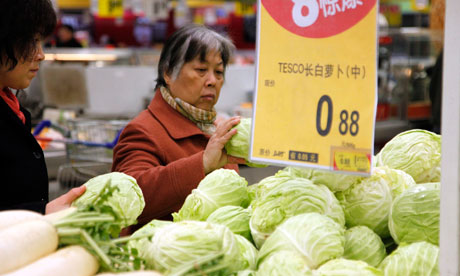Food price hike big headache for many Chinese
|
People buy cabbages at a supermarket. |
While Yang Fugang, breadwinner of an average Beijing family, is complaining about prices rising on almost everything, Zhu Yong, a worker at Xiamen International Airport, actually feels a lot of things are becoming cheaper.
"Now I can buy a cellphone with merely 300 yuan, a laptop with 3,000 yuan, and a car with 30,000 yuan. A high-end TV set used to cost 20,000 yuan three years ago, and now only 5,000, " said Zhu.
"However, cheap as the TV set is, people buy it once and for always, but people need cabbage on a daily basis," he said.
Yao Jingyuan, the Chief Economic Manager of the National Bureau of Statistics of China (NBS), told People's Daily that despite cheaper cars and TV sets, higher food prices bring about the greatest impact on average Chinese families, especially low-income groups.
"The food price rise was responsible for 74 percent of the increase of the CPI, the main gauge of inflation, in November 2010," said Yao.
Besides, the Engel coefficient (the proportion of residents' food expenses to total living expenses) in China is 20 percentage points higher than in developed countries, which means the average Chinese family still spends a sizable part of their income on food purchases.
For Yang Fugang's family, the rise in food prices has made it difficult to make ends meet, since they do not have much left after paying the rent and feeding their one-year-old daughter.
Yang works as a maintenance man in a state-run company. He and his wife live in a one-bedroom apartment with a monthly household income of 4,500 yuan (U.S. Dollar)
"An income of over 4,000 yuan sounds sufficient, but if you have to rent an apartment or raise a child, you will know it barely makes ends meet," said Yang.
Each month they pay rent of 2,500 yuan. "Besides, the price of infant formula milk powder increased by 20 percent over the last year, and diapers by 15 to 20 percent. The prices of vegetables, meat and eggs also shot up, some even doubling from the previous prices," Yang said.
"Fifty yuan used to buy us vegetables which fed our family for a week, but now the same amount of money could only cover three to four days." Yang said his family now pays 500 yuan more each month for food purchases.
Another Beijinger, Zhu Lihua, working as a cleaner, is relying on the community bazaar for cheap vegetables. But now, what worries Zhu most is the rumor that the community bazaar will be dismantled as a face-lifting project for the community.
"Though vegetables sold at the bazaar also become more expensive, still, I can get some good bargains when vendors are about to leave. If the bazaar is gone, our life will get more difficult."
She and her husband live on a monthly income of 1,500 yuan, and 60 percent of their income goes to buying food.
Zhu said, due to the food price hike, she almost never had any fruits last year.
Yao Jingyuan, the Chief Economic Manager of NBS, said the State Council of China has introduced 16 measures to control prices , and one of the most important measures was to distribute subsidies to low-income groups.
 0
0 








Go to Forum >>0 Comments